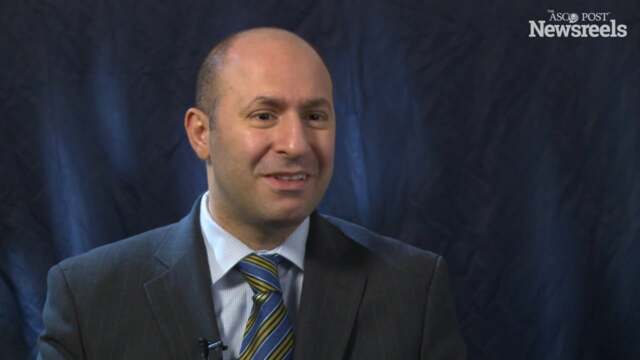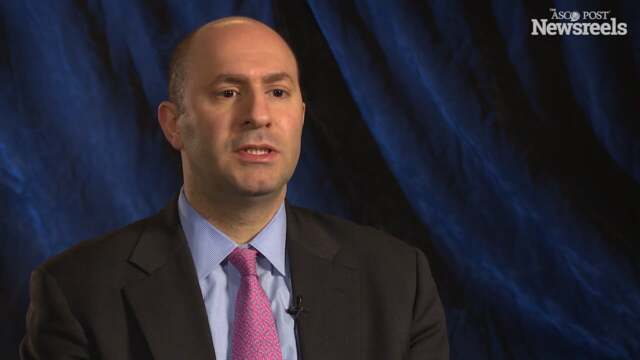Toni K. Choueiri, MD, on Cabozantinib vs Everolimus in Patients With Advanced Renal Cell Carcinoma
Toni K. Choueiri, MD, of the Dana-Farber Cancer Institute, discusses results of the phase III METEOR trial in advanced renal cell carcinoma, which evaluated the efficacy of cabozantinib compared to everolimus in patients with disease progression after VEGFR-targeted therapy (Abstract 4LBA).
Toni Choueiri, MD: Renal Cancer Update
Toni Choueiri, MD, of the Dana-Farber Cancer Institute, summarizes key points from a session he chaired on clear and non-clear cell renal cancer, including information on molecular genetics and its impact on treatment, how to treat patients with non-clear cell histology, and the best strategy for treating clear cell cancer.
Hans-Joerg Hammers, MD, PhD, on Renal Cancer: Using Immune Checkpoint Blockers in the Clinic
Hans-Joerg Hammers, MD, PhD, of the Sidney Kimmel Comprehensive Cancer Center at Johns Hopkins, summarizes this keynote lecture on kidney cancer, which included discussion of the current role of PD-1 monotherapy and future PD-1 combination therapies for renal cell carcinoma.
Bernard J. Escudier, MD, on Renal Cell Carcinoma: Results From the METEOR Trial (French Language Version)
Bernard J. Escudier, MD, of the Institut Gustave Roussy, discusses in French a subgroup analyses of this phase III study of cabozantinib vs everolimus in patients with advanced renal cell carcinoma (Abstract 499).
Bernard J. Escudier, MD, on Renal Cell Carcinoma: Results From the METEOR Trial
Bernard J. Escudier, MD, of the Institut Gustave Roussy, discusses a subgroup analyses of this phase III study of cabozantinib vs everolimus in patients with advanced renal cell carcinoma (Abstract 499). To see the French language version of this video, click here.
Sunitinib-induced Hypertension May Be Efficacy Biomarker in Patients with Metastatic Renal Cell Carcinoma
A retrospective exploratory analysis of pooled efficacy data from more than 500 patients with metastatic renal cell carcinoma treated with sunitinib (Sutent) “support the hypothesis that hypertension may be a viable biomarker of antitumor efficacy in this patient population,” according to a report...
Studies Explore Potential Benefits of Sunitinib before Nephrectomy in Metastatic Clear Cell Renal Cancer
The multitargeted tyrosine kinase inhibitor sunitinib (Sutent) is established as first-line therapy in metastatic clear cell renal cancer. Data supporting use of cytoreductive nephrectomy in metastatic clear cell renal cancer come from the pre–targeted therapy era, when less-effective immune...
Axitinib Improves Progression-free Survival over Sorafenib in Advanced Renal Cell Carcinoma
A randomized comparative effectiveness phase III trial demonstrated significantly superior efficacy for the tyrosine kinase inhibitor axitinib compared to sorafenib (Nexavar) in patients with advanced renal cell carcinoma (RCC). These data suggest that axitinib may become a new standard of care for ...
Adjuvant Immunotherapy Provides No Clinical Benefit in Patients with High‑risk Renal Cell Carcinoma
For renal cell carcinoma patients at high risk of relapse following nephrectomy, adjuvant therapy with the combination of interleukin-2 (Proleukin), interferon alfa, and fluorouracil (5-FU) provides no survival benefit over observation alone, according to a phase III trial conducted by the European ...
Novel Management Strategies Assessed in Renal Cell and Prostate Cancers
At the Best of ASCO Miami meeting, William Oh, MD, of the Tisch Cancer Institute, Mount Sinai School of Medicine, New York, described new trends and remaining questions in the management of renal cell and prostate cancers. Axitinib vs Sorafenib in Second-line RCC Axitinib, a potent and selective...
Significantly Longer Survival with Axitinib Compared to Sorafenib in Patients with Renal Cell Carcinoma
A phase III study comparing the vascular endothelial growth factor receptor (VEGFR) inhibitors axitinib and sorafenib (Nexavar) as second-line therapy in patients with metastatic renal cell carcinoma found that axitinib produced significantly longer progression-free survival. Published in The...
ODAC Backs Axitinib for Kidney Cancer
The FDA’s Oncologic Drugs Advisory Committee voted 13-0 that Pfizer’s drug axitinib (Inlyta) had a favorable benefit-risk profile for patients with advanced renal cell carcinoma after initial treatment has failed. The FDA is due to make a final decision in the first half of 2012. Panelists said the ...
Tyrosine Kinase Inhibitor Therapy Yields Complete Remission in Patients with Metastatic Renal Cell Carcinoma
Targeted therapies have markedly improved outcomes in patients with advanced renal cell carcinoma, with median overall survival of greater than 2 years having been observed with sunitinib (Sutent) treatment. Objective responses, consisting mostly of partial responses, are observed in approximately...
Axitinib Receives FDA Approval in Advanced Renal Cell Carcinoma
The FDA has approved the kinase inhibitor axitinib (Inlyta) for the treatment of advanced renal cell carcinoma after failure of one prior systemic therapy. The approval is based on an international, randomized, open-label trial that enrolled 723 patients: 361 were assigned to receive axitinib at 5 ...
What You Need to Know About Axitinib, New Agent for Treating Advanced Renal Cell Carcinoma
In the Clinic provides overviews of novel oncology agents, addressing indications, mechanisms, administration recommendations, safety profiles, and other essential information needed for the appropriate clinical use of these drugs. Indication In January 2012, the second-generation vascular...
Important News Briefs: New Data Reported in Prostate, Bladder, and Kidney Cancers
The recent 2012 Genitourinary Cancers Symposium featured a wealth of presentations on prostate, bladder, kidney, and other genitourinary cancers. Brief summaries of some of the oral and poster sessions are presented. Exercise and Recurrence Vigorous exercise has been shown to reduce cancer...
GU Symposium 2016: Cabozantinib Improves Upon the Standard of Care for Advanced Kidney Cancer
New analyses from a phase III clinical trial of patients with previously treated advanced kidney cancer demonstrated that patients of all risk levels experience more benefit from cabozantinib (Cometriq) than from the current standard of care, everolimus (Afinitor). The greater activity of...
NCCN Clinical Practice Guidelines: Important Updates for 2012
The National Comprehensive Cancer Network (NCCN) Clinical Practice Guidelines in Oncology have become the most widely used guidelines in oncology practice. The Guidelines cover 97% of all patients with cancer and are continually updated by expert panels. The 2012 Guidelines include some completely...
Partial Nephrectomy Can Optimize Survival in Patients with Early-stage Disease
Following recent clinical trial data from the European Organisation for Research and Treatment (EORTC) showing a survival benefit for patients with small kidney cancers treated with radical vs partial nephrectomy, an analysis using linked Surveillance, Epidemiology and End Results (SEER) and...
Patient Preference Studied in Treatment Selection for Renal Cell Carcinoma
More attention is being paid to the importance of patient preference as a factor in treatment selection. An innovative randomized, double-blind study in patients with metastatic kidney cancer demonstrates that quality of life and side effects drive patient preference.1 Results also suggest that...
Another Tyrosine Kinase Inhibitor Joins the Lineup in Renal Cell Carcinoma
The novel tyrosine kinase inhibitor tivozanib was superior to sorafenib (Nexavar) for the treatment of advanced renal cell carcinoma in the phase III TIVO-1 trial.1 Tivozanib is a potent, selective inhibitor of vascular endothelial growth factor receptors 1, 2, and 3, with a long half-life that is...
Expert Point of View: Tim Eisen, MD, and Robert Figlin, MD
Over the past few years, we have gone from famine to feast.… We now have sorafenib [Nexavar] and sunitinib [Sutent], temsirolimus [Torisel], and everolimus [Afinitor], and interferon plus bevacizumab [Avastin] for treatment of metastatic renal cell carcinoma. If these drugs [in COMPARZ] are...
Pazopanib Noninferior to Sunitinib as Front-line Therapy for Metastatic Renal Cell Carcinoma
Pazopanib (Votrient) is poised to become another option for first-line therapy of metastatic renal cell carcinoma based on results of the phase III COMPARZ trial reported at the 2012 ESMO Congress in Vienna.1 The study met its primary endpoint by demonstrating that pazopanib was noninferior to...
Pulmonary Radiotherapy Can Usually Be Omitted for Nephroblastoma and Pulmonary Metastases
For the majority of patients with nephroblastoma and pulmonary metastases, pulmonary radiotherapy can be omitted and the patients will still have a relatively good outcome, according to a study published in the Journal of Clinical Oncology. “The rationale of omitting pulmonary [radiotherapy] for...
IMA901 Granted Orphan Drug Designation by FDA
immatics biotechnologies GmbH announced that the cancer vaccine IMA901 has been granted orphan drug designation from the FDA for the treatment of renal cell carcinoma (RCC) in HLA-A*02 positive patients. The FDA grants orphan drug designation to novel drugs aimed at treating rare diseases or...
What Combinations Should Be Tested?
If the therapy combinations tested in the BeST trial don’t deserve to move on to phase III trials, what other combinations do show enough promise against renal cell carcinoma to merit being tested in phase III trials? “None at the present time,” maintained Bernard Escudier, MD, of the Institut...
Social Media Is Helping My Brother Fight Kidney Cancer
My brother, Rick Thomas, is a great guy. I’m not just saying that because he’s my brother. He’s funny, warm, and kind to everyone he meets. He became a commercial airline pilot for American Airlines after flying C-5s in the Air Force for 12 years and has always been a responsible person and a...
PET/CT With 124I-Girentuximab Can Identify Clear Cell Renal Cell Carcinoma While Minimizing Invasive Diagnostic Risks
Positron-emission tomography/computed tomography (PET/CT) with iodine-124 (124I) –girentuximab “can accurately and noninvasively identify” clear cell renal cell carcinoma, according to a phase III multicenter study reported in the Journal of Clinical Oncology. In addition, “PET/CT with...
Immunoassay Test May Help Identify Early Kidney Cancer
Renal cell carcinoma is the most common form of adult kidney cancer and the third most common urologic malignancy, accounting for about 2% of all malignancies and 2% of cancer-related deaths worldwide. It is also one of the most difficult cancers to detect and treat because it is usually found...
Three-marker Assay for Early Detection of Renal Cancer
Early detection of renal cell carcinoma using biomarkers remains challenging. Kim and colleagues recently evaluated a three-marker assay consisting of nicotinamide N-methyltransferase (NNMT), L-plastin (LCP1), and nonmetastatic cells 1 protein (NM23A). After validation of the three-marker assay in...
New Findings in Prostate and Kidney Cancers Clarify the Roles of Abiraterone, Finasteride, Bevacizumab, and Surveillance
Attendees at the 2013 Genitourinary Cancers Symposium in Orlando, Florida, were brought up to date with the latest news on cancers of the prostate, testes, bladder, and kidney. Below are selected highlights from the meeting describing findings of noteworthy abstracts to extend our regular news...
Cisplatin and Radiotherapy Linked to Increased Renal Cancer Risk in Childhood Cancer Survivors
Survivors of childhood cancer have an increased risk of subsequent renal cancers compared to the general population, researchers reported in the Journal of the National Cancer Institute. The risk is particularly high among survivors of neuroblastoma and those who have had irradiation involving the...
No Difference in Overall Survival with Axitinib or Sorafenib in Second-line Treatment for Advanced Renal Cell Carcinoma
The phase III open-label AXIS trial comparing axitinib (Inlyta) vs sorafenib (Nexavar) as second-line treatment for metastatic renal cell carcinoma showed significantly prolonged independent radiology committee–assessed progression-free survival with axitinib treatment (hazard ratio [HR] = 0.665, P ...
Using Quality Indicators Can Improve Outcomes among Patients with Renal Cell Carcinoma
An expert panel of 13 urologic and medical oncologists worked together to identify 23 quality indicators for renal cell carcinoma, as described in an article in the Journal of Oncology Practice. “These 23 [quality indicators] will provide a means of evaluating the quality of [renal cell carcinoma]...
Results of AXIS Trial Indicate a Significant Improvement over Historical Survival Data in Renal Cell Carcinoma
The phase III open-label AXIS trial comparing axitinib (Inlyta) vs sorafenib (Nexavar) as second-line treatment for metastatic renal cell carcinoma has shown a significant difference in median progression-free survival (8.3 months in the axitinib group vs 5.7 months in the sorafenib group; hazard...
Progression of Renal Cell Carcinoma Linked to Shifts in Tumor Metabolism
Investigators in The Cancer Genome Atlas (TCGA) Research Network have uncovered a connection between how tumor cells use energy from metabolic processes and the aggressiveness of the most common form of kidney cancer, clear cell renal cell carcinoma. Their findings demonstrate that normal...
First-line Sunitinib Followed by Everolimus Remains Standard Sequence in Metastatic Renal Cell Carcinoma
With the approval of a number of different drugs for the treatment of metastatic renal cell carcinoma, a major issue is how to sequence these drugs to optimize outcome. A large, randomized phase II study called RECORD-3 shows that the standard sequence of the multitargeted tyrosine kinase inhibitor ...
Pazopanib vs Sunitinib in Metastatic Renal Cell Carcinoma: How Do We Choose?
Over the past decade, the field of metastatic renal cell carcinoma therapy has witnessed the development of multiple drugs targeting the vascular endothelial growth factor (VEGF) pathway, based on the underlying biology of renal cell carcinoma that leads to reliance on angiogenic signaling. The...
Progression-Free Survival With Pazopanib Not Inferior to Sunitinib Benefit in Metastatic Renal Cell Carcinoma
Pazopanib (Votrient) and sunitinib (Sutent) have been shown to provide progression-free survival benefit compared with placebo or interferon in phase III trials in metastatic renal cell carcinoma. In a noninferiority trial reported in The New England Journal of Medicine by Robert J. Motzer, MD, of...
Important News Briefs: New Data Reported in Breast, Renal Cell, Head and Neck, and Lung Cancer
The 2013 European Cancer Congress (ECC), held September 27 to October 1 in Amsterdam, was jointly sponsored by the European Society of Medical Oncology, the European Cancer Organization, and the European Society of Radiation Oncology. With the Congress theme being “Reinforcing Multidisciplinarity,” ...
Cancer Has Given Me a Greater Appreciation for Life
I’ve been blessed with good health for most of my life, and I was careful to keep it that way. I don’t smoke, I eat a healthy diet, and I maintain a healthy weight. I also was fortunate to be born with pretty good genes and have no family history of cancer. In fact, except for an occasional...
Tivozanib Improves Progression-Free but Not Overall Survival vs Sorafenib in Metastatic Renal Cell Carcinoma
The investigational agent tivozanib is a selective tyrosine kinase inhibitor of vascular endothelial growth factor receptor (VEGFR)-1, -2, and -3. In a phase III trial reported in the Journal of Clinical Oncology by Robert J. Motzer, MD, of Memorial Sloan-Kettering Cancer Center (MSKCC), and...
Sequencing Sorafenib and Sunitinib in Either Order Does Not Affect Survival in Metastatic Renal Cell Carcinoma
The explosion of new therapies for metastatic renal cell carcinoma is a welcome advance, but studies have not yet defined optimal sequencing of the newer therapies. According to the phase III SWITCH trial, it matters little whether therapy for metastatic renal cell carcinoma begins with sorafenib...
Cytoreductive Nephrectomy Improves Survival in Metastatic Renal Cell Carcinoma Patients With Longer Life Expectancy
Prior to the advent of targeted therapy, cytoreductive nephrectomy was associated with a 6-month improvement in overall survival in patients with metastatic renal cell carcinoma. With new and better targeted therapies for the disease, the appropriate use of cytoreductive nephrectomy has been...
Five Key Studies in Prostate Cancer and Renal Cell Carcinoma
The 10th Genitourinary Cancers Symposium, sponsored by ASCO, the American Society for Radiation Oncology, and the Society of Urologic Oncology, was held January 29–February 1, 2014, in San Francisco. The more than 630 abstracts presented addressed essential research in genitourinary malignancies,...
A Conversation With Arie Belldegrun, MD, FACS, and Allan Pantuck, MD, MS, FACS
Cancer Immunotherapy What is the role of immunotherapy in the treatment of metastatic renal cell carcinoma? The harnessing of the immune system as an effective treatment for cancer was recently selected by the journal Science as the top scientific Breakthrough of the Year for 2013.1 With this...
A Conversation With David I. Quinn, MBBS, PhD, FRACP
First-Line Therapy Please describe current medical oncology approaches to first-line therapy for metastatic renal cell carcinoma. The current first-line therapy for most patients with good- to intermediate-risk metastatic renal cell carcinoma is a vascular endothelial growth factor (VEGF) receptor...
State-of-the-Art Update on Renal Cell Carcinoma
During the course of the 2014 Genitourinary Cancers Symposium, The ASCO Post had the opportunity to speak with several of the world’s leading authorities about the state of the art in screening, diagnosis, and treatment for prostate and kidney cancers. In this second installment of a two-part...
New Research Presented in Wilms Tumor, Pediatric Sarcoma, Head and Neck Cancer, and Non–Small Cell Lung Cancer
In the past few months, numerous presentations from this year’s ASCO Annual Meeting have been covered in depth in the pages of The ASCO Post and online at ASCOPost.com. The brief summaries below capture additional important highlights that have not been covered thus far. We hope you will find them...
Anti–PD-1 Agent Shows Activity in Renal Cell Carcinoma
Renal cell carcinoma can be added to the growing list of tumors that respond to programmed death (PD)-1 immune checkpoint inhibitors, according to the results of the CheckMate trials, presented at the 2014 ASCO Annual Meeting. The phase II CheckMate-010 trial evaluated three doses of nivolumab as a ...





